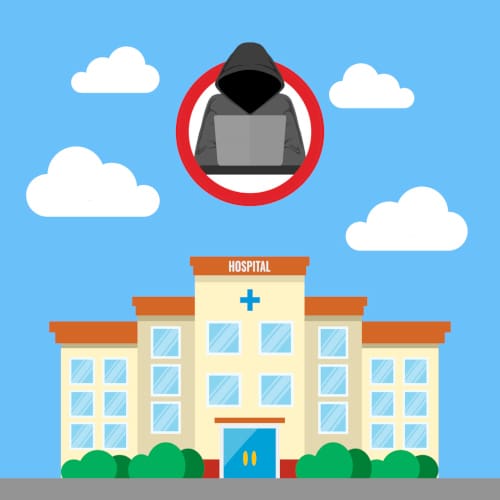In today’s digital age, the healthcare sector has become a prime target for cyber-attacks. These threats are not just about stealing information; they can disrupt patient care, cause financial losses, and erode trust in healthcare institutions. Recent incidents, such as the ransomware attack on a major hospital chain that led to significant data breaches and operational halts, have shown just how vulnerable healthcare systems can be. Such events underscore the urgency for all healthcare professionals, especially nurses, to understand and engage in cybersecurity measures.
Nurses play a pivotal role in healthcare delivery, making them frontline warriors not only in patient care but also in safeguarding patient information and hospital data. The aim of this post is to shed light on the critical role nurses play in cybersecurity. We will explore why their position within healthcare facilities makes them essential to preventing cyber-attacks and what steps they can take to enhance their cybersecurity knowledge and practices. By empowering nurses with this knowledge, we aim to create a more secure and resilient healthcare environment for both providers and patients alike.
Understanding the Threat
In the healthcare sector, the information held is as precious as the care provided to patients. However, this valuable data is under constant threat from cyber-attacks. Understanding these threats is the first step toward protecting against them. Let’s delve into the common types of cyber-attacks targeting healthcare:
- Ransomware: This type of attack involves hackers encrypting a hospital’s data, making it inaccessible until a ransom is paid. Ransomware can cripple hospital systems, delay patient care, and risk lives.
- Phishing: These are deceptive emails or messages designed to trick healthcare staff into revealing passwords or downloading malware. A single click can expose sensitive patient data or infect entire networks.
- Data Breaches: Unauthorized access to patient records can lead to the theft of personal information. Breaches can happen through hacking, lost or stolen devices, or inadvertent disclosures.
Impact on Healthcare
The impact of these cyber-attacks on healthcare can be devastating. They can:
- Disrupt patient care, leading to canceled appointments, delayed surgeries, and compromised emergency services.
- Violate patient privacy, with personal health information exposed or sold on the dark web.
- Incur significant financial costs for healthcare facilities, from ransom payments to fines for violating patient privacy laws and the costs associated with restoring systems and data.
It’s Not Just Theoretical
Recent examples highlight the severity of the threat:
- A large hospital network experienced a ransomware attack that shut down its IT systems, causing significant disruptions to patient care and financial losses estimated in the millions.
- A phishing scam targeting a clinic resulted in the theft of thousands of patients’ health records, exposing them to identity theft and violating privacy laws.
These incidents serve as stark reminders of the risks facing healthcare data and the need for everyone in the healthcare system, especially nurses, to be vigilant and informed about cybersecurity threats. By understanding the types of attacks and their potential impacts, healthcare professionals can better prepare to defend against them, ensuring the safety and privacy of patient information and the continuity of care.

Why Nurses are Crucial to Cybersecurity in Healthcare
Nurses are the backbone of the healthcare system, providing essential care to patients around the clock. Their role, however, extends beyond patient care; they are also crucial to the cybersecurity of healthcare institutions. Here’s why:
- Frontline Observers: Nurses are often the first to notice irregularities in healthcare operations, be it unusual computer behavior, discrepancies in patient records, or suspicious emails. Their position on the front lines means they can act as early detectors of cyber threats, playing a critical role in the timely identification of potential security breaches.
- Guardians of Patient Data: Nurses handle sensitive patient information daily, from medical histories to treatment plans. This interaction requires accessing various digital systems, putting nurses in a prime position to safeguard this data. By following best practices for data security, nurses help protect patient privacy and comply with laws designed to keep health information secure.
- Vital Link Between IT and Patient Care: Nurses act as a bridge between the technical world of healthcare IT and the practical, patient-focused side of hospital operations. They can provide valuable insights into how cybersecurity policies affect patient care and offer suggestions for making these policies more effective without compromising the quality of care.
The importance of nurses in cybersecurity is clear. They are not just caregivers but also protectors of patient data and healthcare operations. By recognizing the signs of cyber threats, safeguarding sensitive information, and serving as a link between IT and patient care, nurses play a vital role in the defense against cyber-attacks. Their involvement in cybersecurity measures is not just beneficial; it’s essential for the safety and security of the entire healthcare ecosystem.
Practical Steps for Nurses to Enhance Cybersecurity
Cybersecurity is a shared responsibility, and nurses, as integral members of the healthcare team, can take proactive steps to strengthen this aspect of their practice. Here are practical measures nurses can adopt:
Education and Awareness
- Stay Informed: Keeping up-to-date with the latest cyber threats and understanding the basics of cybersecurity are essential. Knowledge is power when it comes to recognizing and mitigating potential threats.
- Regular Training: Participate in regular training sessions provided by the healthcare facility. These should cover how to identify phishing emails, secure handling of patient data, and the latest cybersecurity practices and protocols.
Password Management
- Strong Passwords: Create strong, unique passwords for each system and application you use. A strong password includes a mix of letters, numbers, and symbols and does not contain easily guessable information like birthdays or names.
- Update and Protect: Regularly update your passwords and never share them with others. Using a password manager can help you keep track of different passwords securely.
Safe Use of Devices
- Secure Usage: Whether using hospital-issued or personal devices (like computers, tablets, and smartphones) for work-related tasks, ensure they are protected with up-to-date antivirus software and firewalls.
- Avoid Public Wi-Fi: Refrain from using unsecured public Wi-Fi for accessing patient information or performing any work-related tasks. Public networks are prone to eavesdropping and can easily be compromised.
Data Handling and Privacy
- Access and Sharing: Follow the proper procedures for accessing and sharing patient information. Only access the data you need for your role and share patient information securely and only with authorized personnel.
- Privacy Laws: Be familiar with and understand the privacy laws and regulations governing patient data, such as the Health Insurance Portability and Accountability Act (HIPAA) in the United States. This knowledge is crucial for complying with legal and ethical standards.
Reporting and Responding to Cyber Incidents
- Promote Transparency: Foster a culture where reporting suspicious activities or potential breaches is encouraged and supported. Quick reporting can significantly reduce the impact of a cyber incident
- Incident Response: Be aware of the steps to take if you suspect a cyber incident. This includes immediately reporting the incident to the designated cybersecurity team or personnel within your organization.
By implementing these practical steps, nurses can significantly enhance the cybersecurity posture of their healthcare facilities. Education, vigilance, and proactive measures are key components in protecting sensitive patient data and maintaining the integrity of healthcare services.
Implementing a Culture of Cybersecurity
Creating a culture of cybersecurity within healthcare facilities is vital for safeguarding patient information and ensuring the uninterrupted delivery of care. This culture is built on education, collaboration, and continuous improvement, with nurses playing a central role. Here’s how healthcare facilities can support this endeavor.
Supporting Nurses
- Provide Resources: Ensure that nurses have access to the latest cybersecurity tools and training materials. Investing in their cybersecurity education reinforces the importance of their role in safeguarding patient data.
- Empower with Technology: Equip nurses with secure devices and systems that have up-to-date security measures. This not only protects against cyber threats but also streamlines their workflow, allowing them to focus on patient care.

Team Approach to Cybersecurity
- Collaboration is Key: Cybersecurity is a team effort. IT professionals, administrators, nurses, and all healthcare staff must work together to identify vulnerabilities, share knowledge, and implement security measures.
- Regular Meetings: Hold regular meetings with cybersecurity teams, IT staff, and healthcare professionals to discuss current cyber threats, share experiences, and update everyone on new security protocols.
Encouraging Dialogue and Feedback
- Open Communication: Foster an environment where staff feel comfortable reporting potential cybersecurity issues without fear of reprisal. Open lines of communication are crucial for identifying and addressing vulnerabilities early.
- Feedback Loops: Implement mechanisms for nurses and other staff to provide feedback on cybersecurity policies and practices. This feedback can be invaluable for refining and improving cybersecurity measures.
By supporting nurses in their cybersecurity role, promoting a team-based approach, and encouraging ongoing dialogue and feedback, healthcare facilities can build a resilient cybersecurity culture. This culture not only protects against cyber threats but also promotes a safe and secure environment for both patients and healthcare providers. It’s about moving from reactive responses to proactive engagement, where every member of the healthcare team understands their role in protecting against cyber threats. This collective effort is the cornerstone of effective cybersecurity in healthcare.
The Collective Endeavor in Healthcare Cybersecurity
As we navigate the complexities of modern healthcare, the imperative role of nurses in preventing cyber-attacks within healthcare settings cannot be overstated. Nurses, with their unique position at the intersection of patient care and technology use, are pivotal in the fight against cyber threats. However, the responsibility of cybersecurity extends beyond the nursing staff; it is a collective endeavor that requires the commitment and cooperation of the entire healthcare ecosystem.
In conclusion, as the healthcare industry continues to evolve with technological advancements, so too must our approaches to cybersecurity. Nurses, as integral members of the healthcare team, play a vital role in this endeavor. Yet, it is the collective responsibility of all healthcare professionals to stay informed, vigilant, and proactive in their approach to cybersecurity. Together, we can safeguard our future, ensuring that the healthcare sector remains a bastion of trust, care, and innovation. Let us embrace this challenge with determination and unity, for the well-being of our patients and the integrity of our healthcare systems depends on it.

